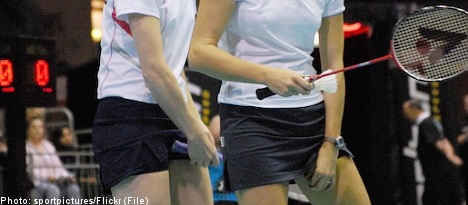Sweden’s badminton establishment is in uproar about the Badminton World Federation’s (BWF) latest scheme to attract viewers to the sport’s events – a skirt demand for female players.
Up until now, female players have been allowed to choose between a skirt and shorts, but from the May 1st, that choice is no longer allowed.
“You don’t know whether to laugh or cry, really,” Sweden’s national badminton team manager Håkan Croona told news agency TT.
The new rules will come into effect for the Super Series tournament.
The Indian Open, which is due to commence on Tuesday next week, will be the last competition where the ladies are allowed to wear shorts.
After that, female badminton players will have a choice of a skirt or a dress.
“I really can’t see how that would attract more viewers,” Thomas Ansgarth, chairman of the Swedish Badminton Federation told The Local.
According to Ansgarth the BWF has been working on creating a distinctive image for the sport for some time and this is just the latest outcome.
Recently, new rules from the BWF made it mandatory for doubles partners to wear the same colours – all to give the sport uniformity.
Badminton is a relatively small sport in Europe but in Asia the interest is huge.
The Swedish federation has had no say in these latest rules and their standpoint is that female players should have a choice – the sport should be in focus and not the attire of the players.
But the new rules will have little effect on Sweden, according to Ansgarth.
“Today 80 or 90 percent of players actually do play in a skirt, so it is only the remaining 10 percent who will be forced to change what they wear on court,” Ansgarth said.
Former Swedish badminton pro Johanna Persson, and instigator of Girls of Badminton, a blog designed to attract and encourage female players to stay within the sport, is flabbergasted by the news of the skirt demand.
“I really don’t think this feels like 2011. I fancy kick starting a real debate within the badminton establishment as to whether this really is something we can endorse. Also, I am curious if shorts are compulsory for the men or if they can opt for a skirt,” she said to TT.
Persson also added that the new rules aren’t only questionable from an equality perspective but can have a serious impact on a player’s game.
“Not everyone is comfortable with playing in a skirt, some really don’t want to and in a practical sense having fabric flapping can be a distraction,” she said.
On the Girls of Badminton blog, opinions on the skirt demand are mixed.
“Is it really the right audience that they are trying to attract? Wouldn’t it be better to try to further the sport in another way than just attracting an audience there to see some leg,” one reader commented on the blog.
“Is it impossible to imagine that someone actually interested in the sport could enjoy resting their eyes on something nice? Compulsion is never good, I agree, but this isn’t so bad. I know of girls who get annual tickets to watch boys play football,” another wrote.
“Idiocy. Completely embarrassing. Would be interesting to see what would happen if the guys turned up in skirts too,” another reader commented.
First to be affected by the new rules are Sweden’s double partners Emelie Lennartson and Emma Wengberg.
“They already play in skirts, but I know that Emelie would rather not have to, “ national manager Croona told TT.
The skirt demand will only affect 12 games in a year for Swedish players and will have very little impact on the badminton scene in Sweden.
But according to Thomas Ansgarth, the Swedish Badminton Federation will take the matter further.
“At the moment we must follow the guidelines but we are definitely putting efforts into this question, “ he told The Local.



 Please whitelist us to continue reading.
Please whitelist us to continue reading.
Member comments